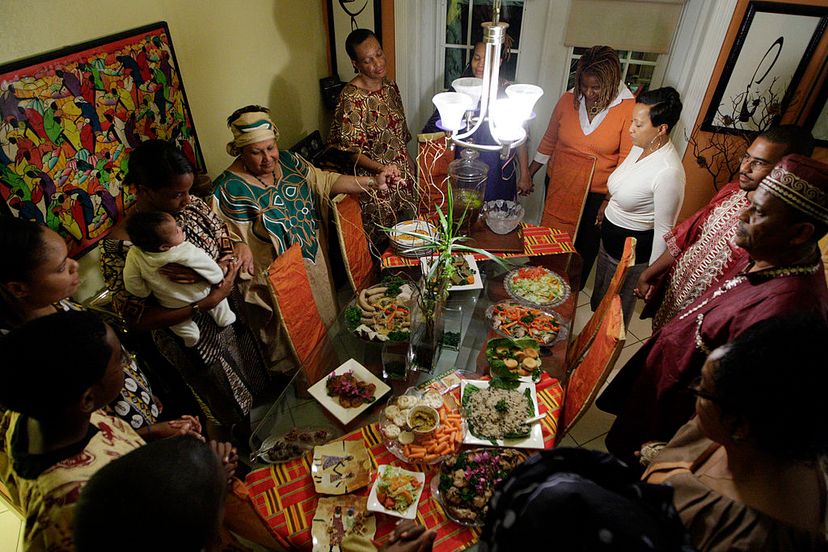The Holiday Feast

On December 31, observers hold a great feast, or Kwanzaa Karamu. The feast is about more than food -- it also is a forum for cultural expression that includes music, dance and readings.
A typical program for a Kwanzaa Karamu might look something like this:
Advertisement
- Kukaribisha (Welcoming) - Introduction and welcome, followed by music, dancing, poetry and other performances
- Kuumba (Remembering) - Cultural reflections
- Kuchunguza Tena Na Kutoa Ahadi Tena (Reassessment and Recommitment) - A short speech by a guest lecturer
- Kushangilla (Rejoicing) - Reading of the libation statement, followed by a communal drink from the Unity Cup and the reading of the names of black ancestors and heroes, followed by a meal
- Tamshi la tutaonan (Farewell Statement) - The reading of a farewell statement accompanied by a call for greater unity
The food served during Kwanzaa is a blend of Caribbean, African and South American flavors. Some popular dishes are fried okra, plantains, fried chicken, black bean soup, baked ham and gumbo. A large mat (Mkeka) is placed in the center of the room, and all of the food is prominently displayed on it.
For more information on Kwanzaa and related topics, check out the links below.
Kwanzaa FAQ
What religion is Kwanzaa?
What is eaten during Kwanzaa?
What is celebrated during Kwanzaa?
When is Kwanzaa?
What are the seven principles of Kwanzaa?
What does Kwanzaa mean?
Related HowStuffWorks Articles
More Great Links
Books
- The Children's Book of Kwanzaa: A Guide to Celebrating the Holiday, by Dolores Johnson
- Kwanzaa: A Celebration of Family, Community and Culture, by Maulana Karenga
- Kwanzaa Crafts, by Judith Hoffman Corwin
- My First Kwanzaa Book, by Deborah M. Newton Chocolate
- Seven Candles for Kwanzaa, by Andrea Davis Pinkney
- Seven Spools of Thread: A Kwanzaa Story, by Angela Shelf Medearis
- The Gifts of Kwanzaa, by Synthia Saint James
Sources
- Collier, Aldore. "The Man who Invented Kwanzaa," Ebony, January 1998, pages 116-118.
- Copage, Eric V. Kwanzaa: An African-American Celebration of Culture and Cooking. New York, New York: William Morrow and Company, Inc., 1991.
- Everything About Kwanza
- Harris, Jessica B. A Kwanzaa Keepsake. New York, New York: Fireside, 1995.
- Kwanzaa Information Center
- The Official Kwanzaa Web Site
- Winchester, Faith. African-American Holidays. Mankato, Minnesota: Bridgestone Books, 1996.